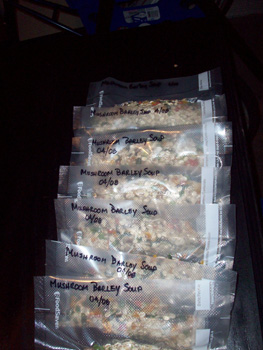Survival Food Kits Should Include MREs, Freeze Dried and Dehydrated Foods
When you are looking for survival food kits, you will need to decide whether to buy pre-prepared kits from a store or to put your own kit together. In either case, you will need to think about having a variety of different food storage options as each comes with its own pros and cons. Most survival experts recommend that you put in a store of food that will last you and your family for up to six months to help you overcome any significant apocalyptic event.
Essential Nutrition

You need to bear in mind several key nutritional points when assembling your supplies, regardless of what kind of survival food kits you are preparing.
- Calories - From a nutritional point of view, an adult is anyone over the age of 16, and the government advice is that each adult needs at least 2000 calories a day just to perform the bodily functions that keep us alive. You will need to make sure that whatever food you put in your survival kit caters to this. You may want to include some high-calorie food against cold weather, which makes you burn more calories.
- Vitamins - Accessing the fresh fruit and vegetables that give you your daily dosage of essential vitamins and minerals will be hard if not impossible in a post apocalyptic event. You will have to work harder to get these into your diet, so as a last resort make sure you have some multivitamin pills in store.
- Fats - In the case of a TEOTWAWKI event, body shape and fat percentages will quickly be ignored in the race for survival. Fat is your body's way of storing energy and protection against cold weather, so you should not be put off by the high fat content in most survival food kits, as they will be doing you a favor in the long run.
What to Include in Survival Food Kits
Different Storage Options
You may be surprised at the many different ways of preserving and storing food to make it last for months and years on end. The best survival food kits will offer you a variety of different food storage types so you can find the ones that work best for you:
- Freeze-dried - The most common type of long-term food storage is freeze-dried. This is where a full meal is made up, frozen and dehydrated to make it fit into an incredible small packet. To make it edible, you simply need to add water and heat it up. You can get all sorts of freeze-dried meals ranging from gourmet dishes to simple fare like meatballs. The only downsides are that they are very expensive and you may not like the way that reconstituted food tastes.
- Dehydrated - Foods dried so that all moisture is gone, ensures that the food can be stored for much longer than fresh. You can either by commercially dehydrated food in cans, pouches, and buckets, or use a food dehydrator to dehydrate and store your fresh garden produce, or to take advantage of supermarket sales.
- MRE - MRE, or meals ready to eat, are the military's answer to food in hostile survival environments. They again are prepared ahead of time and packaged so that you can just open them and heat them up out of the pack. The range of foods will be much narrower than freeze-dried options and you may only save a dollar or two per meal buying MRE from a military surplus store.
- Canned - Canned foods are by far your cheapest option, but also the most bulky. If you only have a small pantry or bunker, hundreds of cans soon add up in terms of space as you'll need at least one for every two people for every single meal. However, having access to cans means you can get fruit and vegetables into your diet, as well as allowing yourself some flexibility with your cooking. You should aim for a mix between canned vegetables and ready-made meals when buying cans for your survival kits.
Having an ample food supply provided through food kits does not guarantee survival but it greatly increases the likelihood that you and your family will meet the challenges of a catastrophic event.
Return from Survival Food Kits to Apocalypse Survival Kit





New! Comments
Have your say about what you just read! Leave me a comment in the box below.